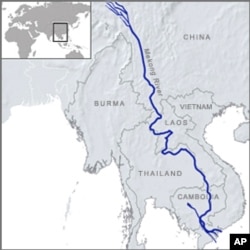A severe drought in Southeast Asia and southern China has caused the Mekong River to drop to a 50-year low. In Thailand, trade on the river has dried up and farmers say they do not have enough water for their crops. Many blame China's dams upstream but experts say the dams may not be the problem.
A group of water experts from the Chiangsaen water monitoring station set out by boat on the Mekong River.
They lower a special pole off the side of the boat that bounces sonar off the riverbed, allowing them to accurately check the water level.
Nappon Nampon says he has been checking water levels on the Mekong for 36 years and this year is the lowest he has ever seen it.
"Chinese boats got stuck on the riverbed. And then China released some water and they were able to go back up river," he said.
Thai customs officials say trade on the Mekong has dropped by more than half this year as large cargo ships from China, the country's largest trading partner on the river, can no longer navigate in the shallow water.
The annual dry season started much earlier than usual, dropping the Mekong to its lowest in decades and affecting millions of people living along the river.
Pak-Ing village is bordered on one side by the Mekong and on another by the Ing River, a tributary.
Farmers usually pump water from the Ing to irrigate their crops.
But farmer Sriwan Suwandee says the Ing, which normally is one to two meters deep, is now down to less than half a meter. His crop this season is only a third of what it should be.
"We pump drinking water from the Mekong River but now the water level is extremely low. Agriculture is bad and another impact is on fishing. There are no fish," he said.
Many villagers suspect China's dams upstream, the only dams on the Mekong River, contributes to the record low water level. The dams have been built to generate electricity.
In a forest not far from the Mekong, a group of villagers celebrate after a religious ceremony that declares trees sacred.
One of those at the celebration is Niwat Roykaew, the director of a network of activist groups that want to see Mekong resources better protected. He says they also want China to share more information about what it is doing with its dams.
"First dam, second dam, third dam and fourth dam now. Have problem because … what's have problem? Because China no speak (does not give information). No speak everything with the people and river," he said.
Jeremy Bird, the head of the Mekong River Commission, says China's dams are not to blame for the drought. He says although there is limited information about China's dams, the commission's river experts have calculated the Mekong would not be much higher if there were no dams in China.
And, he says, once China finishes building its dams and they are fully generating electricity, they will help redistribute water during most dry seasons. That is because to generate power, water must be released through dams steadily.
"The increase in water in the dry season will actually provide opportunities for the lower countries because it provides opportunity for taking water for irrigation or for industrial or urban use," he said.
However, he notes the dams could cause another problem.
"But, also it provides some concerns as I say in terms of reducing the sediment load in the river. And that sediment is high in nutrients. It also feeds the delta area," he said.
The heads of state of Mekong River Commission countries - Cambodia, Laos, Thailand, and Vietnam - meet in Thailand in the coming days along with representatives from China and Burma.
The leaders will discuss the drought and sharing river resources for the benefit of everyone living along the river. They also will ask China to provide more information about its dams and other use of the river.











